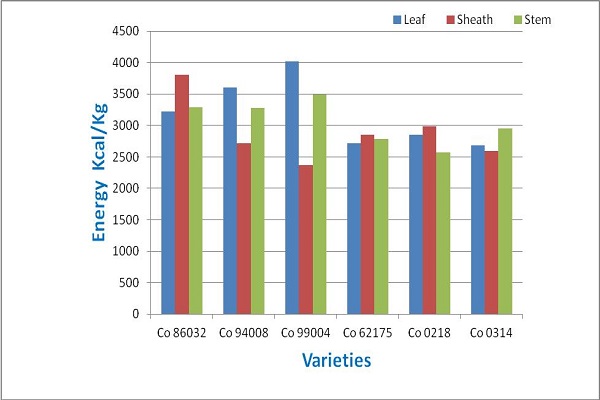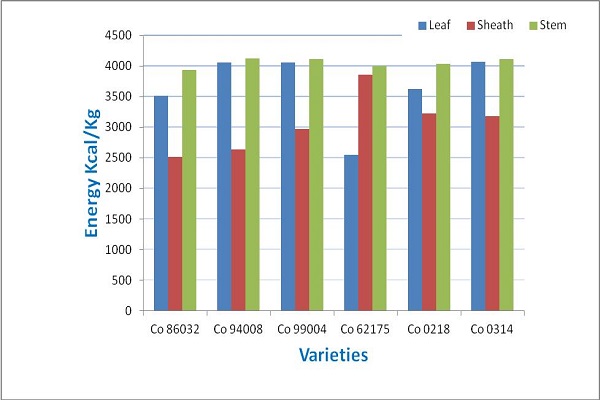Recent Achievements - Plant Physiology
Evaluation of in vivo and in vitro screening technique for high temperature tolerance in Sugarcane
Standardization of temperature induction response technique under in vivo and in vitro condition: Lethal temperature condition for both bud chip raised settlings (in vivo) and callus (in vitro) were identified by subjecting the 30 days old settling and callus for 7 temperatures condition (39ºC, 41ºC, 43ºC, 45ºC, 47ºC, 48ºC and 49ºC) with four time durations (5, 10, 15, & 20 hrs) in BOD incubator. Results indicated that percentage of settling survival and callus viability decreased corresponding with increase in temperature and duration of heat stress. Temperature conditions at 48ºC with 20 hrs and 48ºC with 15 hrs of heat stress treatment was identified as critical temperature condition for settlings and callus respectively. To standardize the sub lethal temperature conditions for bud chip raised settlings of Co 86032 was exposed to gradual increase in temperature from 38, 40, 42 to 44ºC) with two time durations (10 and 15 hrs) followed by lethal temperature (48ºC with 10 hrs). The optimum induction temperature condition for developing thermo tolerance in but chip settlings worked out was 40ºC with 10 hrs stress treatment. Similarly the optimum induction temperature for callus tissue was worked out for the variety Co 86032 (temp: 38 – 44ºC and duration of 10 and 15 hrs).The optimum induction temperature condition for callus for develop thermo tolerance was worked out as 42ºC with 10 hrs stress time.
Testing the TIR technique for 6 popular varieties through in vivo and in vitro condition: Varieties (Co 99004, Co 2001-13, Co 2001-15, CoM 265, Co 218 and Co 315) were utilized for Temperature Inductions Response (TIR) technique both through in vivo and in vitro condition. In all the varieties, callus and settlings that are induced for high temperature recorded higher soluble protein, proline, glycine betaine, total phenols content and ROS enzyme activity compared to non induced callus and settlings. However the varieties, Co 218, Co 315 and Co 99004 performed better in terms of production Hsps and metabolites in response to high temperature compared to CoM 265 and Co 2001-13, Co 2001-15.
Tolerance to Drought and salinity
♣ Pot culture studies on salinity conducted at Karnal Centre confirmed that sugarcane variety Co 0238 was tolerant to salinity and accumulates less Na in the leaves. Salinization and desalinization studies have indicated that salinity effects are partly ionic and partly that of water stress which also depends upon the relative salt resistance of the clone. Salinity primarily affects rates of photosynthesis by affecting stomatal conductance. Other clones which possess tolerance to saline condition were Co 05011 and Co 0239.
♣Studies on drought management and improving productivity of winter initiated ratoon crop under sub-tropical conditions are under progress.
Studies on Energy Potential of Sugarcane-Formative Phase
♣ In a preliminary experiment, the energy production in terms of calorific value of individual plant parts (leaf, leaf sheath and stem) was assessed at different growth phases of sugarcane (formative, grand growth and maturity) in selected sugarcane varieties. The juice quality was estimated during maturity months.

♣ The leaf and stem dry mass content was high in Co 94008 and thus the total dry mass production was also high (4.32 kg/m2) in this variety. The average partitioning of dry mass in to leaf, sheath ant stem was 16.87, 9.31 and 73.82%, respectively, suggesting greater dry mass production by stem. The energy production potential in the leaf tissue varied from a minimum of 2681 kcal/kg in Co 0314 to a maximum of 4025 kcal/kg in Co 99004 at formative phase (Fig.1). Varieties Co 94008 and Co 86032 recorded 3607 and 3228 kcal/kg, respectively. In the sheath tissue, the calorific value varied from a minimum of 2371 kcal/kg in Co 99004 to a maximum of 3805 kcal/kg in Co 86032. The stem of variety Co 99004 recorded a maximum of 3488 kcal/kg followed by Co 86032 which has recorded 3295 kcal/kg.
Studies on Energy Potential of Sugarcane - Grand Growth Phase
♣ At grand growth, the energy production potential was appreciably high in stem. Varieties Co 94008, Co 99004, Co 0314 recorded more than 4000 kcal/kg. It was obvious that stem contribution towards energy production was extremely high in all cane varieties.

♣ At harvest, leaf tissue of Co 0218 exhibited maximum energy production of 4131kcal/kg while the stem of variety Co 99004 possessed maximum energy content of 4029 kcal/kg in stem. The stem of varieties Co 86032, Co 94008, Co 62175 and Co 0314 produced 3856, 3825, 3840 and 3825 kcal/kg, respectively, at harvest. Thus in future, a drift towards energy generation is likely to occupy a prominent place in cane agriculture and identification and evolution of energy rich sugarcane varieties is the need of the hour.
Other experiments
♦ The effect of ethrel or glyphosate on sucrose synthesis and accumulation in sugarcane was evaluated under field conditions.
♦ Studies on tiller mortality and means of improving tiller survival in sugarcane is under progress.
Contact Address
-
ICAR-Sugarcane Breeding Institute
Veerakeralam,
Coimbatore 641007
Tamil Nadu. - Phone: 0422 - 2472621
- Email: director.sbi@icar.gov.in
- GST Number 33AAAAD2962K2ZT
Our Visitor Count







